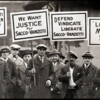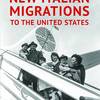Why I’m Boycotting This Year’s Italian American Studies Association Conference
I’m not attending this year’s Italian American Studies Association (IASA) conference in Washington, D.C. I have decided not to participate because IASA has coupled its annual conference with the annual gala of the National Italian American Foundation (NIAF). While these two organizations share an interest in things Italian American, that’s where the similarities end. The respective goals of these two organizations’ concern with things Italian American are in opposition. Ultimately, this partnership is to IASA’s detriment.
IASA is a scholarly organization, as its website states:
The organization’s interdisciplinary nature also allows space for creative artists, especially writers, to present their work.
NIAF is an ethnic-focused advocacy group as its online mission statement reads:
IASA does not seek “to promote and inspire a positive image and legacy of Italian Americans;” on the contrary, it studies the representations of Italian Americans in film and literature. Media and film scholars who present at IASA conferences may discuss some aspect of “The Sopranos,” but their object is not to advocate for a “positive image” of Italian Americans.
In addition, some IASA members study historical and contemporary manifestations of Italian American voluntary associations like NIAF and the Order Sons of Italy in America, analyzing their political and cultural positions on a number of matters. For example, some of my preliminary scholarship on the topic can be seen in previous posts on i-italy.org (in the RELATED ARTICLES box above), although numerous published examples can be found in Italian American Studies bibliographies.
Another problematic of this partnership is that NIAF has repeatedly presented public views of a partisan variety, thereby potentially compromising the academic integrity and rigor of the scholarship coming out of IASA. IASA is now officially affiliated with an organization that has publically advocated for politically conservative Supreme Court nominees Antonin Scalia and Samuel Alito. The issue is not the specific politics the organization endorses but the simple fact that a scholarly organization such as IASA should remain independent of such partisan engagement.
Perhaps the most disturbing outcome of this partnership is the way in which NIAF has branded and, I would suggest, co-opted the IASA conference in its publication of the conference program. NIAF has effectively hijacked IASA by splaying its tricolor logo on the IASA program and linking its events to the academic papers and panels. IASA’s thoughtful program next to NIAF’s celebratory events creates a risible parody of an ethnic-scholarly program that might have been created by The Onion:
Not only is this arrangement embarrassing for IASA and its members, it is a setback.
For many years, the organization’s members struggled to rename the association from the American Italian Historical Association to the Italian American Studies Association. For those advocating for the current name—and I was one of them—the original had become inaccurate and outdated as IASA’s scholarship had moved beyond that of history. In addition, the name Italian American Studies Association was more aligned with other scholarly organizations whose focus is ethnic and racial groups, like the Association for Asian American Studies and the National Association for Chicana and Chicano Studies. The coupling of the NIAF gala and IASA conference reinforces the kind of belittling of ethnic studies—that is not specific to Italian American Studies—with anti-intellectual and reactionary responses criticizing ethnic studies work as not serious.
In the recent past, NIAF has invited some scholars associated with IASA to speak about their research and other concerns on special panels during the NIAF gala. Such a model for partnership—in which professors of Italian American studies were sought after for their contributions to understanding Italian American history and culture—is in line with the goals and vision of IASA and better serves both the academic scholarship and NIAF’s mission. This year’s gala-conference partnership undoes that by subsuming the academic within the advocacy and celebration rather than highlighting the academic work as a separate approach, one that seeks to document, understand, and critique the history, culture, and on-going experiences of Italian Americans and the Italian diaspora.
I have been an on-again, off-again member of IASA since 1989 and have been attending the conference annually since 2002. As an social scientist working in the field of Italian American Studies I am committed to the strengthening of IASA as the premier organization in the field. While I miss the opportunity to hear current scholarship and to dialogue with my colleagues this year, I will be participating in the 2016 conference.





































i-Italy
Facebook
Google+
This work may not be reproduced, in whole or in part, without prior written permission.
Questo lavoro non può essere riprodotto, in tutto o in parte, senza permesso scritto.